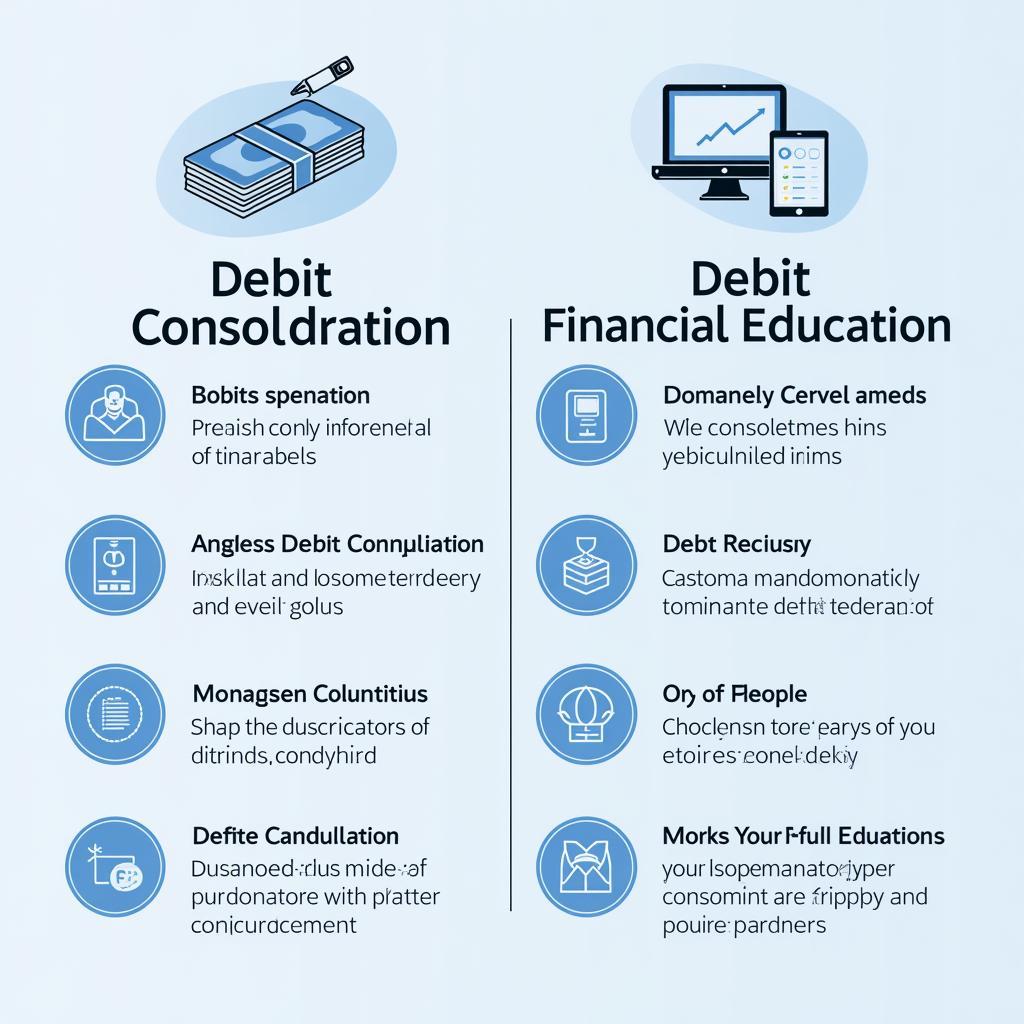Debt consolidation and financial recovery topics have appeared frequently in recent IELTS exams, particularly in Task 2 essays. Based on analysis of past papers from 2019-2023, this theme appears approximately once every 4-5 months, making it a significant topic for test preparation.
Let’s examine a recent question that exemplifies this topic:
Many people face serious debt problems due to excessive borrowing. Some experts suggest debt consolidation as a solution, while others believe financial education is more important. Discuss both views and give your opinion.
Analysis of the Question
- Topic: Personal finance and debt management
- Task: Discussion + Opinion
- Key elements to address:
- Debt consolidation as a solution
- Financial education’s role
- Personal stance with justification

Band 8-8.5 Sample Essay
In today’s consumer-driven society, mounting personal debt has become a pressing concern, with both debt consolidation and financial literacy education proposed as potential remedies. While both approaches have their merits, I believe a combination of these solutions is most effective for achieving lasting financial stability.
Debt consolidation offers immediate practical benefits for individuals struggling with multiple debts. By combining various high-interest loans into a single, more manageable payment with lower interest rates, people can reduce their monthly financial burden and avoid defaulting on payments. For instance, someone with multiple credit card debts at 20% interest could consolidate them into a single loan at 10%, significantly reducing their monthly obligations and creating a clear path to becoming debt-free.
However, financial education serves as a crucial preventive measure against future debt problems. When people understand basic financial concepts, budgeting techniques, and the implications of borrowing, they are better equipped to make informed decisions about their money. For example, in South Korea, where financial literacy is emphasized in schools, young adults demonstrate better money management skills and lower personal debt rates compared to countries without such educational programs.
I believe the most effective approach is to implement both solutions simultaneously. While debt consolidation provides immediate relief, financial education ensures long-term success by addressing the root causes of debt accumulation. This complementary approach has proven successful in countries like Singapore, where government-sponsored debt consolidation programs are paired with mandatory financial counseling.
In conclusion, although debt consolidation offers quick relief and financial education provides long-term prevention, combining both approaches creates the most comprehensive solution for addressing personal debt issues. Governments and financial institutions should work together to provide both immediate debt relief options and accessible financial education programs.
Band 6.5-7 Sample Essay
Many people nowadays have problems with debt, and there are different ways to solve this issue. While some experts think debt consolidation is the best solution, others believe that teaching people about money is more important. I think both methods can help people with their debt problems.
Debt consolidation can help people who have too many loans. When someone combines all their debts into one loan, they usually get a lower interest rate and only need to make one payment each month. For example, if someone has three credit cards with high interest rates, they can get one loan to pay off all the cards and then just pay back that one loan with less interest.
On the other hand, financial education is also important because it helps people understand how to manage their money better. When people learn about budgeting and saving, they can avoid getting into debt in the first place. In my country, many young people get into debt because they don’t understand how credit cards work or how interest rates affect their loans.
I think both solutions are necessary to help people with debt problems. Debt consolidation can help people who are already in trouble, while financial education can prevent future problems. For example, my friend used debt consolidation to manage his loans, but he also took some financial management classes to learn how to budget better.
In conclusion, I believe that both debt consolidation and financial education are important tools for helping people with debt problems. The government should provide both services to help people manage their money better.
Key Vocabulary
- Debt consolidation (n) /dɛt kənˌsɒlɪˈdeɪʃən/ – combining multiple debts into a single loan
- Financial literacy (n) /faɪˈnænʃəl ˈlɪtərəsi/ – ability to understand and manage financial matters
- Mounting (adj) /ˈmaʊntɪŋ/ – increasing, growing
- Default (v) /dɪˈfɔlt/ – fail to fulfill a financial obligation
- Root cause (n) /ruːt kɔːz/ – the fundamental reason for a problem
- Interest rate (n) /ˈɪntrəst reɪt/ – percentage charged for borrowing money
- Financial burden (n) /faɪˈnænʃəl ˈbɜːdən/ – money-related difficulty or stress
- Budgeting (n) /ˈbʌdʒɪtɪŋ/ – planning how to spend money
Practice Suggestions
Consider practicing with these related topics:
- The role of banks in preventing personal debt
- Government intervention in personal finance
- The impact of credit card culture on society
- Financial literacy in school curriculum
Share your practice essays in the comments section for feedback and discussion with fellow learners.